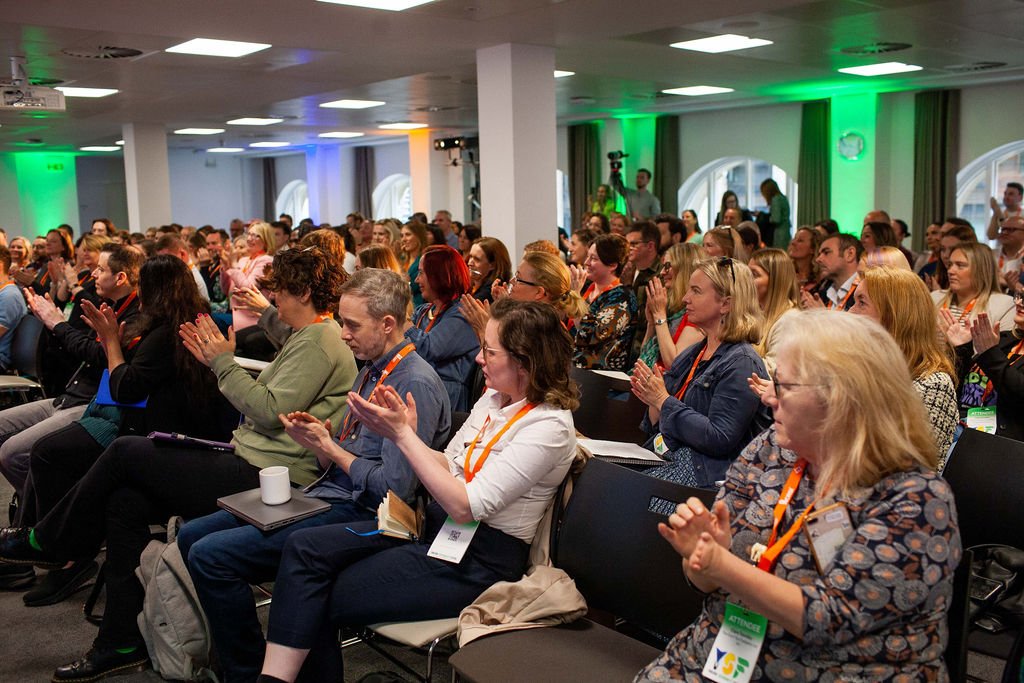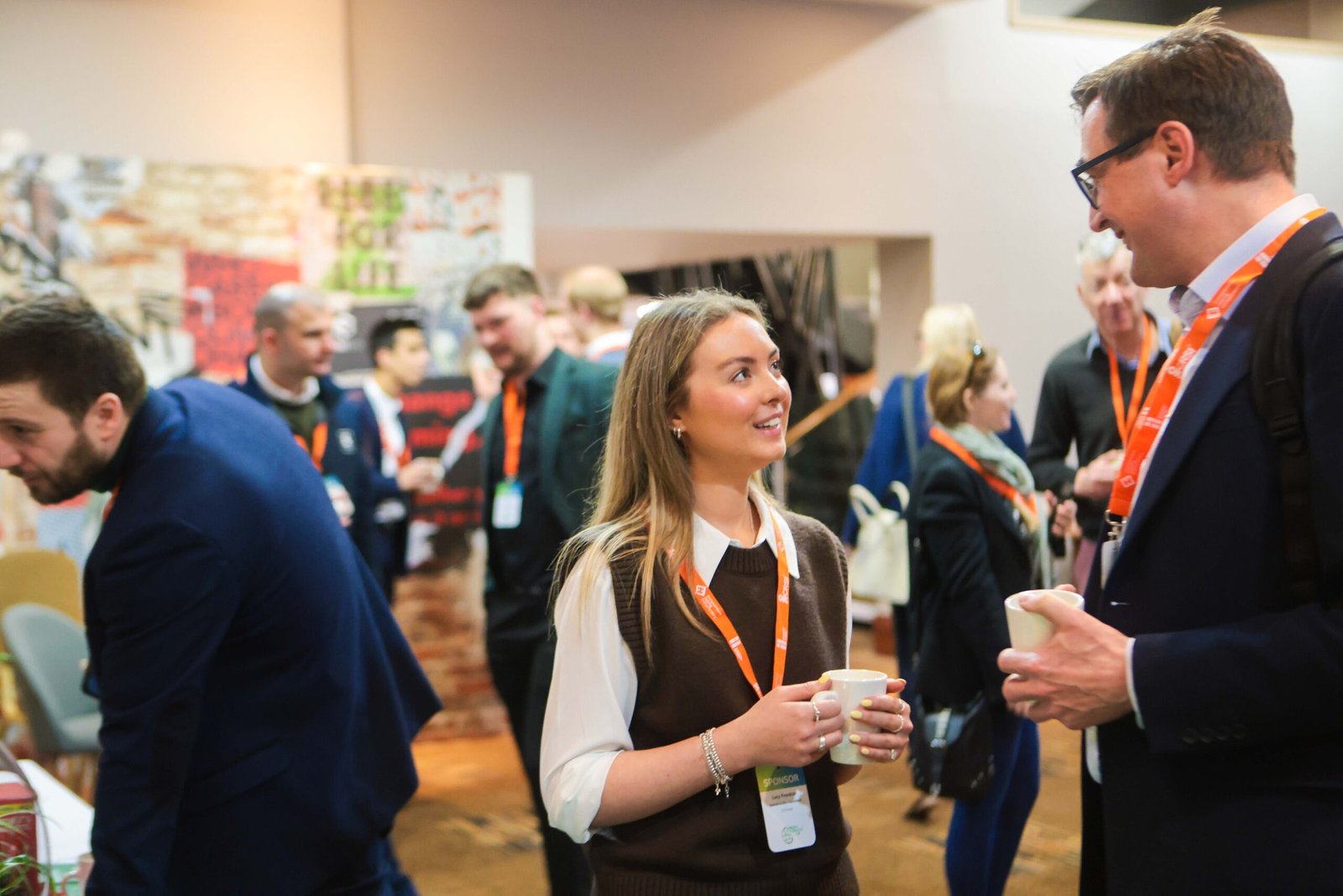When it comes to building a greener economy, it’s often easy to think in sweeping, national terms – legislation, investment, infrastructure. But what if change begins more locally? What if the most powerful engine for transformation is regional, relational, and rooted in connection?
That’s exactly the vision behind The Sustainability Community, founded by Kate Hutchinson.
From her base in Leeds, Kate is stitching together a fast-growing network of sustainability leaders across the UK. What began as a single regional event has become a national movement, with 12,000 members and a calendar of conferences designed to accelerate a just, green transition – from retrofit to renewables, and policy to people.
“The green economy is the biggest economic opportunity of our time,” Kate says. “But for it to work, it has to include everyone – not just London, not just corporates, but every region, every voice.”
Her work isn’t just about content. It’s about catalysing. Creating the spaces – and stories – that show what’s possible when purpose, policy, and profit come together.
The Spark
Kate Hutchinson didn’t pivot gently. She walked through fire – literally.
After running a successful (but under-the-radar) events business for several years, the world shifted beneath her feet. First the pandemic, then an economic crash, then a major client withdrawing overnight. It was enough to make her consider selling up.
But instead of signing the offer, Kate did something unusual.
“I went on a firewalk,” she says. “Seven times across burning coals. I asked the fire for my purpose.”
Five days later, the idea arrived – vivid, urgent, full-body. She was at another sustainability event when it hit her: this is what she was meant to do.
Not just stage events -but instead galvanise a movement.
Yorkshire Sustainability Week was born that day. She bought the domain on her phone and called her web developer during lunch. That evening, she shared the idea on LinkedIn.
By morning, her inbox was overflowing.
“It was like everyone was waiting for it,” she says. “We delivered the first festival in eight months – 20 events, 1,000 people. That’s when I knew: this is where we go next.”

The Model
What began as a single week of events in Yorkshire has evolved into a national platform accelerating the green economy – one region at a time.
The Sustainability Community now operates with a clear structure designed for both depth and scale:
- 12,000-strong member network
Business leaders, innovators, policymakers, and purpose-led organisations across the UK. - Regional conferences and exhibitions
Events focused on key themes – green energy, circular economy, green finance, future cities, and more. - Flagship annual event: Regeneration Earth
A national gathering that brings all regions together under one roof – next held 18–19 June in Leeds. - Segmented, story-led communications
With targeted email campaigns and a LinkedIn-first marketing strategy reaching over 500,000 annually. - New membership model launching September 2025
Designed to offer year-round value, stabilise income, and deepen engagement between events. - Pay It Forward ticketing
Ensures access for those who need it most, echoing Kate’s own experience of being supported when it mattered.
Kate’s approach is relational, responsive, and region-first. As she puts it: “Not everything good happens in London. And the journey to net zero must be led region by region.”
“I asked the fire for my purpose… and five days later, the idea for Yorkshire Sustainability Week came to me. It was like a full-body experience. I knew that’s what I was meant to do.”
– Kate Hutchinson, Founder, The Sustainability Community
The Impact
From the very beginning, Kate’s mission has been clear: to grow the green economy, not just in policy or intention, but in people, jobs, and places that have too often been overlooked.
The results are already tangible.
- Regional regeneration
By hosting events in post-industrial towns and cities – from Yorkshire to the Midlands and beyond – the Sustainability Community redirects attention, opportunity, and investment where it’s most needed. “We’re proving good things can happen up north,” Kate says. - Cross-sector inclusion
Every event is carefully curated to welcome both established experts and newcomers. Panels balance CEOs with young people. Sessions cater to both beginners and specialists. The message is clear: everyone belongs here. - Economic acceleration
The green economy is growing 4–5 times faster than the national average – over 9% annually. Kate’s work helps make this growth visible, actionable, and inclusive across the country. - Network effects
With 12,000 members and counting, the ripple effect of one connection, one introduction, one conversation, is powerful. “The magic happens when people come together,” she says. And they’re coming – by the thousands. - Cultural shift
More than just data and panels, the community is changing the story around sustainability – from one of sacrifice to one of opportunity.
The Marketing
Kate’s strategy is refreshingly focused: build trust, speak directly, and meet people where they already are.
Rather than stretching across multiple platforms, The Sustainability Community has chosen to double down on LinkedIn – and it’s paying off:
- 500,000+ people reached annually through organic content
- 10,000 followers on Kate’s personal LinkedIn, acting as a primary amplifier
- 12,000 engaged contacts via email, segmented by interests and events
Targeted communications based on whether someone’s attending, interested, or unaware – ensuring every message is timely and relevant
“We haven’t had big budgets for PPC or ads. But we’ve built something real by being present, consistent, and human,” Kate shares.
Their content isn’t flashy. It’s personal. It’s relevant. And it invites people into a bigger conversation.
With a clear brand voice and a steady drumbeat of updates, insights, and invitations, The Sustainability Community is quietly rewriting the rulebook on how green economy networks grow.
The Finances
Kate is unapologetic about profit – and refreshingly honest about the realities of bootstrapping a purpose-led business.
“We’re not a CIC. We’re a limited company. And we’re not afraid of profit. You can be good and make money.”
- That clarity has shaped how The Sustainability Community funds its mission. Revenue streams include:
- Sponsorship from aligned organisations
- Ticket sales for regional and flagship events
- New membership model launching September 2025 for year-round income
- Growth trajectory:
- Revenue has grown year-on-year since inception
- The team has expanded to 8 people, with 5 new hires in the past 3 months
- Six conferences are planned for 2026, up from three this year
- Financial challenges:
- Event income naturally peaks and troughs, creating cash flow volatility
- Corporates often favour London, making regional funding harder to secure
The membership model is designed to solve this – building a more stable income base while deepening community engagement. “We’re ready for it now. We’ve built the value first. Now we’re offering a way to sustain it.”
The Vision
Kate doesn’t just want to grow a network. She wants to reshape the system.
Her long-term goal? A global sustainability community – one that is rooted in local relevance but connected across borders.
“We’ll expand into Europe first. Then Canada. One region at a time, in the way that region needs.”
It’s a vision built on balance: the hyperlocal and the international. The everyday and the systemic. The measurable and the meaningful.
Over the next five years, the plan includes:
- Launching new events across the UK – from the North East and North West to the Midlands and South
- Establishing regional community managers to provide hyper-local support
- Expanding into European regions, with tailored programmes that reflect each area’s needs
- Eventually, building toward a truly global, connected community of sustainability leaders
Kate’s approach isn’t about replicating a centralised model. It’s about creating conditions – in each place – where regenerative economies can take root.
“You can’t reach net zero nationally without going region by region,” she explains. “That’s how the change happens.”
“Good businesses can make profit and still be good businesses. Money isn’t evil. That’s how we change the system - not outside it, but through it.”
– Kate Hutchinson, Founder, The Sustainability Community
The Challenges
Despite the community’s momentum, the road hasn’t been smooth. And Kate is the first to name the hurdles.
“This is the hardest thing I’ve ever done,” she admits. “The rollercoaster of entrepreneurship is real – one day it feels amazing, the next day the floor drops out.”
Some of the toughest challenges include:
- Funding the early stages
Building something at scale without big backers meant finding creative ways to make it work. Asking for help, often for the first time, became essential. - Convincing sponsors to think beyond London
Many national organisations default to London-based budgets. “The minute we say an event is in Yorkshire, the funding has to come from a regional pot – which is often much smaller.” - Sticking to values under financial pressure
“We’ve turned down funding from big oil and gas. Not everyone does that. But we know it would do more harm than good to our mission and reputation.” - Educating while growing
Many still misunderstand what the green economy is – or how it applies to them. Part of the work is constant explanation, translation, and storytelling.
But through it all, Kate has held firm. “We’re building something that matters. That means staying true – even when it’s hard.”
The Mindset
Kate’s clarity of purpose runs deep – shaped by a childhood in a family of teachers, a degree in sociology, and a firewalk that set her new course.
“I grew up in a house where work was a vocation. You did good because that’s what mattered.”
That sense of service, combined with a sharp understanding of social systems, is woven into everything she builds. But it’s not just about doing good – it’s about doing it well.
“Money isn’t evil. Good businesses can make profit. That’s how we change the system – not outside it, but through it.”
Her leadership philosophy is grounded in a few key beliefs:
- Purpose and profit are not opposites – they can reinforce each other when values are clear.
- Connection is the catalyst – meaningful change happens when people meet and share ideas.
- Generosity is a growth strategy – open your network, open your heart, and trust the rest will follow.
- Ambition must be balanced with patience – not every goal can be met right away, and sometimes raising the bar too quickly can cloud the progress already made.
At her core, Kate is a connector. Not of cables, but of people. Not of power, but of possibility.

The Wisdom
Kate’s journey is rich with lessons – not just about building a business, but about holding your nerve when the path ahead is unpaved. Here are a few of her takeaways:
- Ask for help before you think you deserve it
“It took me years to ask for support. The minute I did, doors opened.” - Anchor your values early
Define who you’ll work with – and who you won’t – before the money gets tempting. - Don’t wait to be ready
That first event was launched with no logo, no website, and a spreadsheet. “You’ll never feel fully ready. Do it anyway.” - Focus beats visibility
One platform (LinkedIn) done well can outperform being everywhere. Know where your people are – and show up consistently. - Make sustainability feel inclusive
Speak in plain language. Create spaces for beginners. Welcome every voice to the table. - Centre joy and opportunity in your storytelling
“People don’t want to be guilted into change. They want to be excited about what’s possible.”
Try This
Inspired by Kate’s journey? Here are five actionable ideas to root good growth in your own business or project:
Ask for help early, not perfectly
Don’t wait until your plan is polished. Kate’s first pitch was a spreadsheet and belief. Reach out before you feel ready — doors often open when you’re honest about the ask.Start with what you have
Yorkshire Sustainability Week was launched with no logo, no brand, just clarity of purpose and a GoDaddy domain. Begin where you are. Progress follows commitment.Put values before shortcuts
Turn down misaligned money. Even when it’s tempting. Kate’s choice to decline big oil sponsorships kept her mission clear and credibility intact.Design with inclusivity in mind
Make events, platforms, or content welcoming for beginners. Ditch the jargon. Sit CEOs beside students. Let different voices shape the room.Lead from your local
You don’t need a national spotlight to start a movement. Begin in your town, your region. As Kate says: “Not everything good happens in London.”
